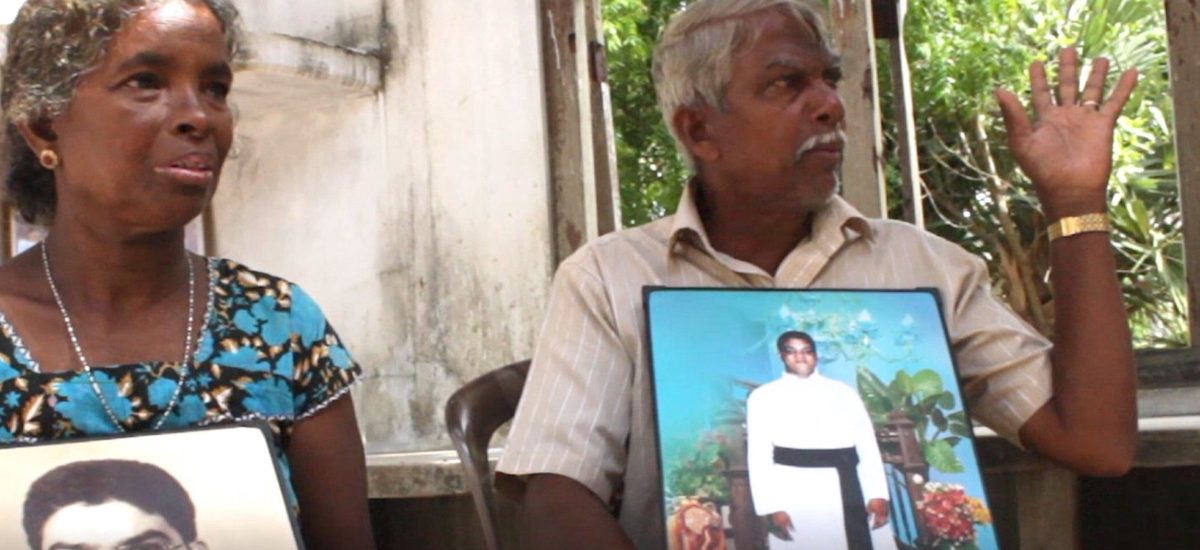Photo courtesy of Ruki Fernando
On August 20, 2006, Father Jim Brown, a Catholic Priest, and Wenceslaus Vimalathas, his associate, disappeared. They were last seen at a Navy check point in Allaipiddy in the Jaffna district while they were going to visit displaced civilians in the Navy controlled village.
August was a tragic month for Allaipiddy. On the night August 12, the parish priest, Father Brown had welcomed civilians flocking to the local Catholic church seeking refuge from the fighting. But the church was also attacked and 36 people were killed in the premises and many more injured. Father Brown pleaded with Navy officers to allow the injured to be taken away. In May, nine civilians were killed in the village, including a four month-old infant and four year-old child.
It was a time when many Tamils were being subjected to enforced disappearances in the highly militarized Jaffna District and other parts of the country but due to the fact that he was a Catholic priest, Father Brown’s disappearance became well known. The past 15 years have shown that there can be no truth and justice even for the disappearance of a Catholic priest. Less than three years after he disappeared, on the last day of the war in May 2009 another Catholic priest, Father Francis Joseph, disappeared after he was last seen surrendering to the Army and taken away in a bus. There have been other Catholic priests who have also disappeared and been killed and they have all been people who opted to provide support to oppressed civilians and raised their voices against injustices. More than 65,000 complaints have been received by state institutions about Sri Lankans who have disappeared.
In an article written five years ago, journalist D. B. S. Jeyaraj said that the Navy had refused to hand over the log book of the checkpoint where Father Brown had been last seen to the police despite an order from the Acting Magistrate who had visited the area. He also reported that the Navy had fired gun shots in the air as the Magistrate and the police were leaving Allaipiddy. A 2007 report by University Teachers for Human Rights-Jaffna (UTHR-Jaffna) had a similar narrative. Both explain that the Navy has been hostile to Father Brown and that Navy’s version of the time he had reported to the check point defers from that of an eyewitness, a Catholic priest.
Father Brown’s disappearance and the May 2006 massacre in Allaipiddy together with the killing of four others in two nearby villages were among 16 high profile incidents of serious violations of human rights that a Presidential Commission of Inquiry appointed in 2006 was asked to investigate. Their report in May 2009 said that Father Brown’s case was not investigated due to lack of evidence and as the body of the “alleged deceased” was not found. The Commission said they didn’t have time to investigate the Allaipiddy massacre.
Father Brown’s mother passed away without knowing what happened to him. Whenever I visit, his elderly father always wonders whether he will know what happened before he too passes away.
Attacks on churches
Allaipiddy Catholic church is not the only church in the Jaffna diocese that had seen civilians being killed inside it during the war. The 1995 July aerial attack on Navaly Catholic church and surrounding village resulted in about 147 civilians being killed, many of them of whom were displaced and seeking refuge in the church. Several civilians were also been killed in the aerial attack on the Gurunagar Catholic church in 1993.
In 2019, in quite a different context, on Easter Sunday suicide bombers attacked two Catholic churches in the Colombo Archdiocese and Zion Church in Batticaloa, resulting in deaths of about 200 in three churches. Simultaneous attacks in hotels caused about 70 more deaths. About 600 are estimated to have been injured.
Tomorrow, two years and four months after the attacks, the Archdiocese of Colombo has called for a campaign to demand truth and justice by raising black flags at home and ringing church bells. Similar to the Black Sunday protest in March this year demanding justice for Easter Sunday attacks, the call to raise black flags has already received wide publicity in the media. The Archbishop of Colombo, Cardinal Malcolm Ranjith, and many Catholics have expressed lack of hope and trust in domestic processes for truth and justice and called for international justice. These demands and sentiments echoes those of Tamils (including Catholics) for decades, including for incidents such as the disappearance of Father Brown. Irrespective of whether it is domestic or international, joint efforts by different ethnic groups will strengthen struggles for justice as well as solidarity and co-existence.
Read other articles by the author on Father Brown and church bombings here and here.


